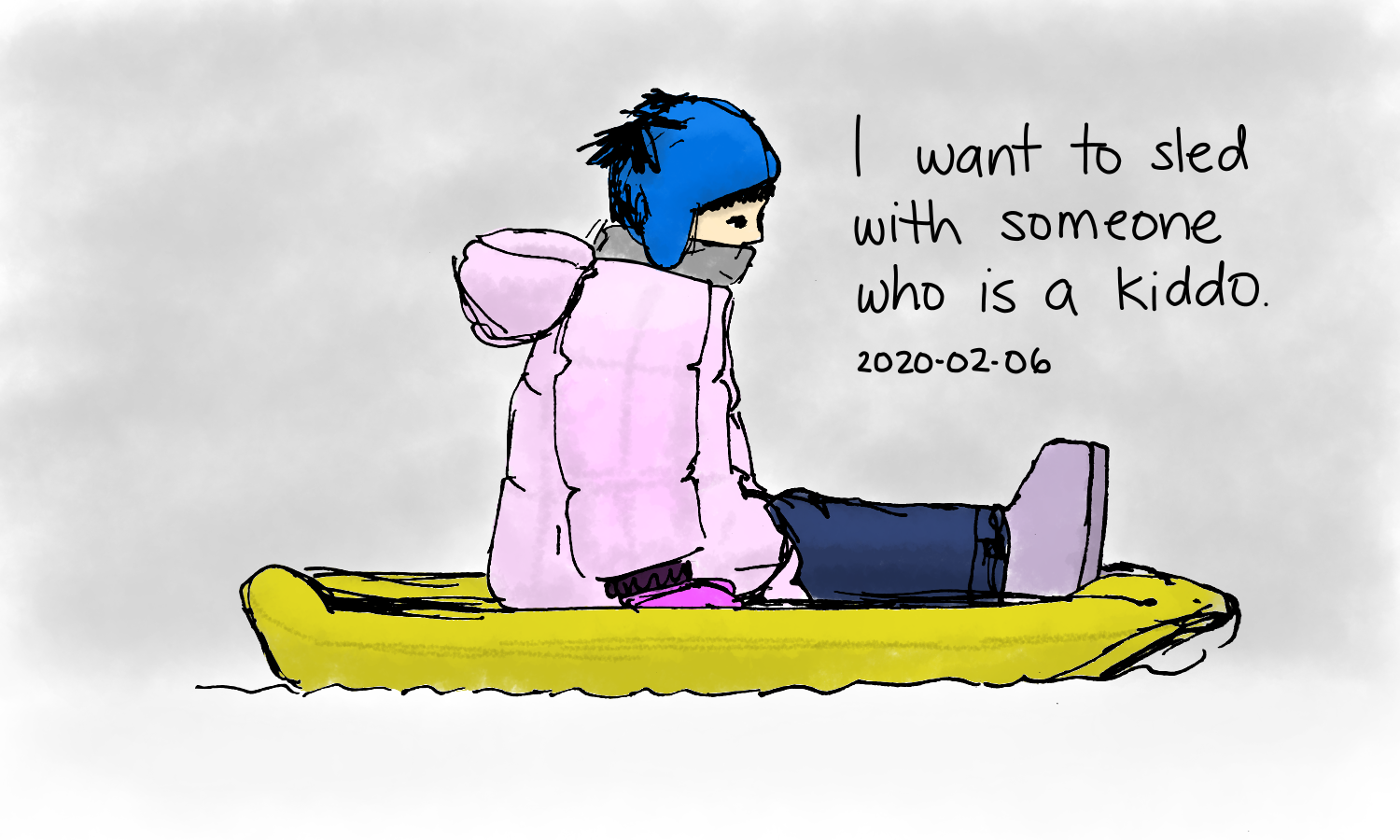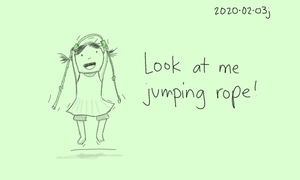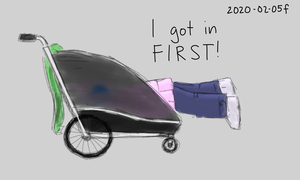We’ve had twenty babysitting sessions so far. We started weekly experiments in May 2018, when A- was a little over two years old. She asked me to stop after eight sessions, since she wanted to play with me instead. We resumed in April 2019 because A- wanted to give it another try. I wanted to quickly reflect on how that experiment has been going and think about how we can build on it.
What have we been doing?
We scaled up from 4 hours a session to 7 hours a session. This works really well for me because it gives me one or two chunks of focused time long enough to dig into and solve reasonable problems. It probably works out even better than a half-day preschool program, since transitions chew up so much time.
I increased it to 2 sessions during the week because we might be away for a trip, so I wanted to front-load some consulting and personal time.
We started booking Saturday sessions as well so that W- and I can work on house projects together. I think it’s worth investing the time and money in developing my DIY skills, and I want A- to grow up seeing us do that kind of stuff.
What have I learned from having all these different babysitters?
A- gets along well with lots of different people. She switches over to focusing on the new babysitter within a few minutes, and she seems comfortable heading out to the park with them even if it’s just the first time they’ve met. She’s good at communicating what she wants and can be easily understood. She generally likes to take the lead, but she’s willing to accept suggestions and reminders.
There’s one babysitter that A- loves, a few she’s okay with, and a few she’s less keen on. A- seems to respond well to energy and engagement. Even when A- and the babysitter don’t click as well, I learn something from what I think might be missing. It inspires me to be more engaged, too. It’s great having such a variety of people. It’s like being able to experiment with different parenting styles and personalities while keeping A- constant.
A- likes the crafts and games they suggest, and often asks to repeat them. The babysitters often introduce things I wouldn’t have thought of trying with A- just yet, so I’m pleasantly surprised by her capabilities. They’ve made it out to playgrounds a few times, although A- often prefers to stay close to home.
A- really likes helping me pay for the babysitter, too. She’s learning to recognize different numbers and bills. Hmm… If the sitters don’t mind, I might switch to paying mostly in 10s so that she can get used to hearing that sequence of numbers. I talk to her about withdrawing cash from my savings, how I earn that money by working, and how the babysitters earn their money by working too. We even talk about receipts and taxes in the process.
What did I do with the time?
- Consulting: 25.5 hours, or a little less than 50% of the hours since we resumed the experiment in April. Lots of SQL and Javascript. Working during the daytime is much, much nicer than staying up late. I make faster progress and feel happier, and I can talk to my clients as needed. Also, if I remember to go to bed early, I have more energy when I’m with A-.
- Coding: I worked on a bunch of little tweaks for Emacs and my phone so that I can update Emacs News and my journal more easily. I also organized my files, updated my blog, and did lots of little kaizen projects.
- House stuff: I painted the cabinets, and I’m looking forward to doing more house things.
- Organization: I tidied up my basement workspace and organized my files.
- Errands: I took two hours to go to the Philippine consulate. It was nice not worrying about whether A- would get bored or need to go to the bathroom.
- What didn’t I do? Drawing, sewing, batch-cooking, and self-care still felt lower-priority than other things I could do with that time. Writing is pretty sporadic too, although I turned a few Emacs tweaks into blog posts.
- ECE: I’ve only done a little bit of early childhood education reading and preparation. I could spend more time and energy doing this, since enriching our days together will likely pay off more than incremental tweaks to my computer or phone setup.
What concerned me before?
How would the sitters interact with A-? I see a lot of parents and caregivers focused on their phones or other adults while their kids play fairly independently, and I can be like that too unless I make an effort. So far, most of the babysitters we’ve gotten have seemed pretty engaging, though. Seeing them in action helps me appreciate the kind of play skills I want to develop myself. At some point, A- will be more interested in playing by herself or with other kids. At the moment, though, she wants lots of interaction, and it’s amazing what she can learn with someone’s help and appreciation. I think my ideal at the moment is for A- to have a supportive and appreciative play partner who expands her vocabulary and understanding, occasionally asks questions or suggests things that challenge her, and sometimes models new techniques. It’s hard to do that sort of stuff, so I’m glad I can pay for role models.
I want to learn more from how sitters interact with A- without disrupting them. I can hear them from the basement, and I come up for snacks and for transition time. (Then A- says, “Why did Mama come up?”, in a “I’m fine, I want to keep playing with the babysitter, Mama go back downstairs” sort of way.) Hmm… If the babysitter’s okay with it and if it doesn’t mess with my concentration too much, maybe I can listen on the baby monitor when I’m working on personal projects.
Less awareness of A-‘s interests and growing skills? As it turned out, I didn’t need to worry about this at all. When A- is interested in something, that interest runs through everything she does. I still feel in tune with what she’s curious about and what she’s working on.
Less exposure to household stuff? Not an issue at the moment. A-‘s still involved in getting groceries, cooking, cleaning, and other things we do around the house. I’d like to eventually involve her more in DIY, but that can wait until I have more skills and she has more self-control.
What’s the next step?
More time? A- often tells me that 7 hours is too short. She wants to try 8 hours, which means we need to:
- get ready earlier in the day
- do chores early afternoon so that we can have dinner and do bedtime soon after the sitter leaves
- help her get the hang of either going out, playing, and napping in the stroller, or resting during quiet time.
Eight hours might make it easier to get an occasional babysitter outside the agency, if we decide to go that route. Summer is coming up, and it might be awesome to snag a teacher or early childhood educator on a summer break.
Do we want to consider a regular babysitter or daycare? I actually like the variety that comes from having different babysitters, and we don’t offer enough hours or commitment for someone else to commit to us for a longer term anyway. At the moment, A- is more interested in playing with a grown-up or by herself than with other kids. I’ll expose her to more group situations later on, but in the meantime, I think it’s worth having someone focus on her, help her answer her questions, read her tons of books, and so on.
How can I build on what A- does? Babysitters often come with one or two ideas and we have a lot of open-ended supplies, so they’re already doing pretty well. The table I made is a little too text-heavy for them to quickly glance at, but quick verbal instructions and one activity pouch might work. I can rely on their experience to figure out what level A- is at and come up with an appropriate challenge or spin. In fact, they generally do a better job at this than I do, so the less I get in their way, the better.
A- freely shares what she’s interested in (“I’m a firefighter!”), so I don’t need to brief them on that, since a good babysitter will pick up A-‘s cues and incorporate them into activity suggestions. I have plenty of days with A- for following up on those interests anyway. (We’ve been to the fire station four times in a little over a week…)
It might be interesting to build on techniques, which I can pick up by asking about crafts and displaying her work. For example, A- has been very interested in painting and then folding the paper or placing another piece of paper on top, and she repeated that technique with other sitters and with me. If I annotate her art with the date (and possibly sitter name), that also helps me cross-reference it with the babysitter when asking A- about her babysitter preferences.
Another level would be to build on concepts. If I systematically go through something like Playing Preschool, that might help me spot opportunities to sneak more learning into stuff A- wants to do. She can generally fill the whole day with things she wants to do, but she’s curious about new things in her environment, so that’s how I might be able to provoke her curiosity. I can work on getting the hang of this myself before figuring out how to get the babysitters on board with it too, since they’re already doing a great job of exposing A- to different kinds of activities. I don’t want too much structure, anyway – just a little to support more discovery and thought.
There’s something pretty interesting about this setup, and we’re very lucky to be able to do stuff like this. I’m curious about how to make the most of it.




